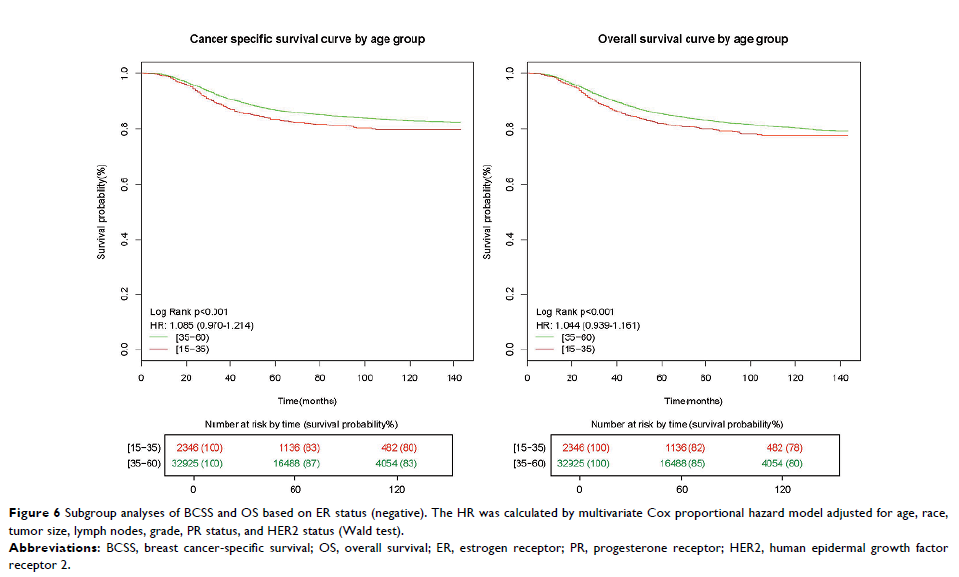108384
论文已发表
注册即可获取德孚的最新动态
IF 收录期刊
- 3.4 Breast Cancer (Dove Med Press)
- 3.2 Clin Epidemiol
- 2.6 Cancer Manag Res
- 2.9 Infect Drug Resist
- 3.7 Clin Interv Aging
- 5.1 Drug Des Dev Ther
- 3.1 Int J Chronic Obstr
- 6.6 Int J Nanomed
- 2.6 Int J Women's Health
- 2.9 Neuropsych Dis Treat
- 2.8 OncoTargets Ther
- 2.0 Patient Prefer Adher
- 2.2 Ther Clin Risk Manag
- 2.5 J Pain Res
- 3.0 Diabet Metab Synd Ob
- 3.2 Psychol Res Behav Ma
- 3.4 Nat Sci Sleep
- 1.8 Pharmgenomics Pers Med
- 2.0 Risk Manag Healthc Policy
- 4.1 J Inflamm Res
- 2.0 Int J Gen Med
- 3.4 J Hepatocell Carcinoma
- 3.0 J Asthma Allergy
- 2.2 Clin Cosmet Investig Dermatol
- 2.4 J Multidiscip Healthc

较小的年龄是早期乳腺癌的一个独立的不良预后因素:一项以人群为基础的研究
Authors Zhang X, Yang J, Cai H, Ye Y
Received 6 March 2018
Accepted for publication 23 July 2018
Published 27 September 2018 Volume 2018:10 Pages 4005—4018
DOI https://doi.org/10.2147/CMAR.S167363
Checked for plagiarism Yes
Review by Single-blind
Peer reviewers approved by Dr Colin Mak
Peer reviewer comments 3
Editor who approved publication: Professor Kenan Onel
Objective: To compare the prognosis of young breast cancer patients with the older ones.
Patients and methods: Utilizing the Surveillance, Epidemiology, and End Results database, we identified 150,588 female breast cancer patients diagnosed during 2003–2014, including 6,668 patients younger than 35 years and 143,920 patients aged between 35 and 60 years. Kaplan–Meier analysis was performed to compare the prognosis of these two groups. Univariate and multivariate Cox proportional hazard models were utilized to identify independent prognostic factors and calculate the HR and 95% CI. Subgroup analysis was performed stratified according to the lymph node status and estrogen receptor (ER) status.
Results: The young patients presented with more aggressive clinicopathological characteristics, including larger tumor size (P <0.001), more lymph node metastasis (P <0.001), higher grade (grades III and IV, P <0.001), more ER/progesterone receptor absence (P <0.001), and more human epidermal growth factor receptor 2 overexpression (P <0.001). The patients younger than 35 years presented with inferior breast cancer-specific survival (BCSS) and overall survival (OS) (log-rank, P <0.001) in comparison with the older ones. In the multivariable Cox proportional hazard regression analysis, young age remained to be an independent adverse prognostic factor in operable breast cancer in terms of BCSS (HR, 1.200; 95% CI, 1.110–1.297; P <0.001) and OS (HR, 1.111; 95% CI, 1.032–1.196; P =0.005). In the subgroup analysis, young age remained a significant adverse prognostic factor in N0 (BCSS), N1, and ER-positive subgroups (P <0.05).
Conclusion: Young age is an independent adverse prognostic factor in operable breast cancer. Young patients may receive more intensive treatment than older ones.
Keywords: breast cancer, young, characteristics, survival
